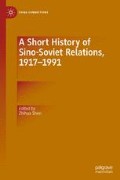Abstract
This chapter discusses the impact of the Twentieth Congress of the Communist Party of the Soviet Union (CPSU) on Sino-Soviet relations. The Twentieth Congress raised the Stalin issue, which prompted a series of deep questions regarding the socialist road and development, and had a latent impact on the evolution of Sino-Soviet relations. According to available records, Mao differed little from Khrushchev on the Stalin issue. This chapter argues that the Twentieth Congress had no negative impact on Sino-Soviet relations. Subsequent developments show that the Sino-Soviet relationship became closer and without signs of serious divergence in the wake of the Twentieth Congress. But public “self-criticism” of the CPSU and the unveiling of Stalin’s mistakes lowered the CPSU’s prestige and shook its leadership role in the socialist camp.
Access this chapter
Tax calculation will be finalised at checkout
Purchases are for personal use only
Notes
- 1.
Lorenz M. Lüthi, The Sino-Soviet Split: Cold War in the Communist World (Princeton, NJ: Princeton University Press, 2008), p. 46.
- 2.
See Anne Applebaum, Iron Curtain: The Crushing of Eastern Europe, 1944–1956 (New York: Doubleday, 2012).
- 3.
For details on the Twentieth Congress and the origins of Khrushchev’s secret speech, see Shen and Xia, Mao and the Sino-Soviet Partnership, pp. 134–41.
- 4.
It was during the Moscow Conference in November 1957 that the CCP stated its different views on peaceful transition, and it was during the Sino-Soviet polemics in September 1963 that the CCP publicly announced its different views on peaceful transition.
- 5.
Whereas the Soviets stressed all-out detente, the Chinese paid more attention to peaceful coexistence with its neighbors.
- 6.
Fedor M. Burlatskii, Khrushchev and the First Russian Spring: The Era of Khrushchev through the Eyes of his Adviser (New York: Charles Scribner’s Sons, 1988), p. 73.
- 7.
For details, see Elidor Mëhilli, “Defying De-Stalinization: Albania’s 1956,” Journal of Cold War Studies, vol. 13, no. 4 (Fall 2011), pp. 4–56.
- 8.
Roy Medvedev, Khrushchev: A Biography, tr. Brian Pearce (Garden City, NY: Anchor Press/Doubleday, 1983), p. 86.
- 9.
A day before formal publication of the article, the CCP CC issued a circular, requesting that “Party committees at every level should organize study sessions among party and youth league members as well as non-party personnel, and should send progress reports on those issues that had been discussed to the CCP Propaganda Department.”
- 10.
“On the Ten Major Relationships,” 25 April 1956, in Selected Works of Mao Tsetung, vol. 5 (Beijing: Foreign Languages Press, 1977), p. 304.
- 11.
“Talks at a Conference of Secretaries of Provincial, Municipal, and Autonomous Region Party Committees,” in Selected Works of Mao Zedong, vol. 5, p. 354.
- 12.
Gao Hua, How the Red Sun Rose: The Origins and Development of the Yan’an Rectification Movement, tr. Stacy Mosher and Guo Jian (Hong Kong: The Chinese University Press of Hong Kong, 2018), pp. 661–705; Daniel Leese, Mao Cult: Rhetoric and Ritual in China’s Cultural Revolution (Cambridge: Cambridge University Press, 2011), pp. 25–86.
Author information
Authors and Affiliations
Corresponding author
Editor information
Editors and Affiliations
Rights and permissions
Copyright information
© 2020 The Author(s)
About this chapter
Cite this chapter
Shen, Z. (2020). The Twentieth CPSU Congress and the Eighth CCP Congress, 1956. In: Shen, Z. (eds) A Short History of Sino-Soviet Relations, 1917–1991. China Connections. Palgrave Macmillan, Singapore. https://doi.org/10.1007/978-981-13-8641-1_11
Download citation
DOI: https://doi.org/10.1007/978-981-13-8641-1_11
Published:
Publisher Name: Palgrave Macmillan, Singapore
Print ISBN: 978-981-13-8640-4
Online ISBN: 978-981-13-8641-1
eBook Packages: Social SciencesSocial Sciences (R0)

